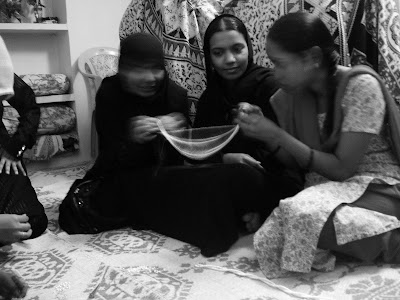


 Whatever you say about India, you're wrong. I've been wrong for the last eleventy posts, and will be just as wrong in this one. At least India has given me this one thing--consistency. Just as my first sojourn in India coerced me into developing an entirely new skill set--directing plays that nearly cause riots, walking straight into freeway-speed traffic, deciding that my left hand is an appropriate substitute for toilet paper--so did my second. Along with another former Rotary Ambassadorial scholar (Cate) and a few other American women, I returned to Hyderabad with POP Jewelry Collective. POP is a women's handicraft business Cate started in order to employ women in one of the worst Hyderabadi neighborhoods. The women make jewelry, we sell it in the US for inflated prices, and then the money goes back to that neighborhood in the form of school supplies, wages for the women, and scholarships. The goal is to educate ourselves while we help provide a platform for Indian women to become educated, empowered entrepreneurs. Business savvy has never exactly been high on my list of personal descriptors, but India isn't known for keeping one in the comfort zone. Continuing the theme of tackling projects for which I'm under-qualified, I also helped make a documentary about our trip, which you can watch here. I did a lot of the filming, some of the voice overs, and took the photos you see in the first segment.
Whatever you say about India, you're wrong. I've been wrong for the last eleventy posts, and will be just as wrong in this one. At least India has given me this one thing--consistency. Just as my first sojourn in India coerced me into developing an entirely new skill set--directing plays that nearly cause riots, walking straight into freeway-speed traffic, deciding that my left hand is an appropriate substitute for toilet paper--so did my second. Along with another former Rotary Ambassadorial scholar (Cate) and a few other American women, I returned to Hyderabad with POP Jewelry Collective. POP is a women's handicraft business Cate started in order to employ women in one of the worst Hyderabadi neighborhoods. The women make jewelry, we sell it in the US for inflated prices, and then the money goes back to that neighborhood in the form of school supplies, wages for the women, and scholarships. The goal is to educate ourselves while we help provide a platform for Indian women to become educated, empowered entrepreneurs. Business savvy has never exactly been high on my list of personal descriptors, but India isn't known for keeping one in the comfort zone. Continuing the theme of tackling projects for which I'm under-qualified, I also helped make a documentary about our trip, which you can watch here. I did a lot of the filming, some of the voice overs, and took the photos you see in the first segment.Part One: http://www.youtube.com/watch?
Part Deuce: http://www.youtube.com/watch?
Multimedia aside, India was as India as it ever was, crashing into me and filling me with joy at the phrases necessary to describe my existence. My favorites:
- As I stand at the side of the road, foreign coins lining my pockets, contemplating hurling myself into traffic once more, I am nearly run over by a wobble-lipped camel.
- I charm my way into an air-conditioned restaurant by bobbling my head indiscriminately, to discover that the featured dish of the day is Taliban Soup.
- In Mecca Masjid, a turbaned man comes up to us. I am concerned he is angry that we are not properly dressed (and not Muslim), but all he wants to do is assure us that Islam has more people of peace than it does of violence. "Bad Muslims are like the driver of a truck…it is not that truck's fault if the driver steers into a tree."
- As I sit on the side of the road, a man dressed as Charlie Chaplin walks up and unblinkingly stares at me for five minute, straight, twiggling (it's a word now) his mustache the whole time. I swear, the bats in my belfry are going to form a tenant's union at this rate.
- I love how trains let you into the lives of people as they slice through India. . .for a moment, I am an old woman carrying a sled-sized tray of dirt on my heed, chest-deep in water
- In the slums, the smell of cilantro somehow cuts through the stink of fetid water, and to the right, a bus stop is filled with orange and yellow flowers.
- My friend Bilal, who runs a hotel, comes and sits beside me after checking out a bunch of his countrymen. He sighs, puts his head in hands, and says "I don’t like Indians.”
- In India, it seems everything is operating in its superlative version--everything is the best, the brightest, the strongest, the most dramatic...and the worst, the most grotesque, the lives so terrible they make god seem heedless and cruel.
http://www.popjewelrycollective.com/ http://www.thelearningtea.com/



